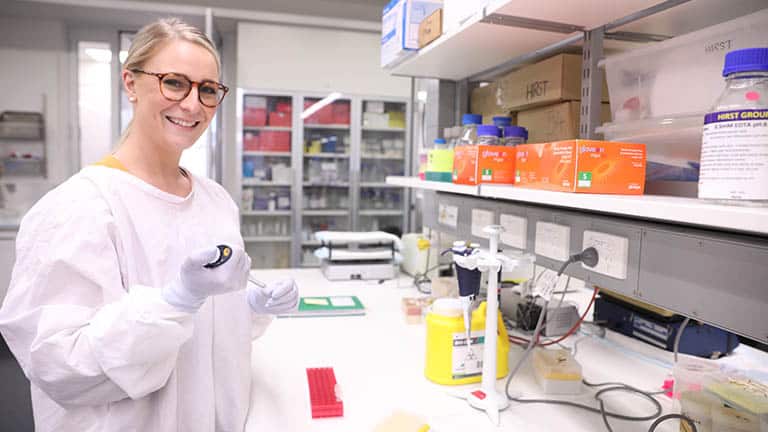
Dr Bridie Goggins is a postdoctoral researcher working in the Gastrointestinal Research Group at HMRI. But (probably more famously) she’s the brains behind HMRI’s 2019 Open Day’s hugely popular Poo Room. Bridie conceived of the Poo Room to demystify and de-stigmatise the gut, and poo. We don’t often talk about poo, or people who are suffering with gut problems. Bridie wants to change that.

Dr Bridie Goggins is a postdoctoral researcher working in the Gastrointestinal Research Group at HMRI. But (probably more famously) she’s the brains behind HMRI’s 2019 Open Day’s hugely popular Poo Room. Bridie conceived of the Poo Room to demystify and de-stigmatise the gut, and poo. We don’t often talk about poo, or people who are suffering with gut problems. Bridie wants to change that.
Bridie’s work explores two areas: IBD (Infammatory Bowel Disease) and, more recently Necrotising Enterocolitis.
There’s a pretty good chance that you will know someone who has Inflammatory Bowel Disease. The two most common forms of IBD are Crohn’s Disease and Ulcerative Colitis. Both of these conditions aren’t generally considered fatal (although complications from severe disease can be fatal), but they are incredibly debilitating and really reduce a person’s quality of life. If you have IBD you’re likely to experience severe abdominal pains (cramping), fatigue, anaemia through blood loss in poo, severe diarrhea, and there are also links to high rates of anxiety and depression.
A person with IBD is likely to need to go to the toilet up to 20 times a day, so this really impacts on their social life and quality of life.
We don’t really know what causes IBD, but it’s believed to be a combination of the following:
People with IBD are said to have a ‘leaky gut’ which means that the normally selectively-permeable lining of the gut (the epithelium) which is a single layer of cells has increased permeability (it lets through more than it should). Normally it allows passage of nutrients, and keeps out bacteria and other nasties, but with IBD, things don’t behave as they should. Isn’t it crazy that the only thing separating our underlying tissue from what we ingest is a SINGLE layer of cells that is less than 20 microns thick (that is 0.001 of a millimetre)?!
Bridie’s second research project links from her PhD work with the epithelium. Necrotising Enterocolitis (or NEC as it’s commonly known) affects one in 10 premature babies. Tragically, of these, up to 50% will die. NEC basically means a ‘dead gut’ and tragically, it’s really hard to diagnose. Babies with the condition traditionally get very, very sick after birth within a week or two after birth, they become intolerant to feeds, and get very bloated. The only way to confirm a NEC diagnosis at the moment is surgery, where the damaged gut is removed. For babies with this condition there are long-term health implications including a short gut and neurological impairments.
Again, we still don’t know what causes this condition – but it’s believed that a few things have an impact such as oral feeding (whether the babies are breast of formula fed), oxygen deprivation, impaired gut motility (movement of food through the GI tract) and exposure to bacteria (again a leaky gut), all of these things impact the epithelium (that single cell layer). There has been recent evidence that suggests there is a cross talk between our enteric nervous system which has been termed the ‘little brain in the gut’ and our epithelium. My work now looks at the cross talk between the two and how it may impact the formation of the epithelium in a preterm babies gut, which may make it more susceptible to NEC.
Dr Bridie Goggins spoke with ABC Newcastle’s Kia Handley. Listen to their chat here
HMRI would like to acknowledge the Traditional Custodians of the land on which we work and live, the Awabakal and Worimi peoples, and pay our respects to Elders past and present. We recognise and respect their cultural heritage and beliefs and their continued connection to their land.

Hunter Medical Research Institute
We’re taking healthy further.
Locked Bag 1000
New Lambton
NSW, Australia, 2305



This site is protected by reCAPTCHA and the Google Privacy Policy and Terms of Service apply.
Copyright © 2024 Hunter Medical Research Institute | ABN: 27 081 436 919
Site by Marlin Communications
